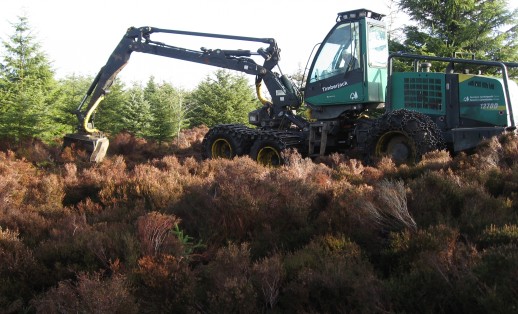
The Forestry Commission have sent us a report on a new use for one of their harvesters.
A machine more used to cutting down trees destined for sawmills throughout Wales is playing a vital role in helping to preserve some of our rarest plants, insects, and bird life.
Forestry Commission Wales has converted one of its harvesters to solve the problem of restoring sensitive heathland which endangered species such as the black grouse depend on.
FC Wales removed the harvester’s cutting head and replaced it with a powerful flail with fixed, hardened teeth which can mulch trees and vegetation in order to preserve a patchwork of heather and heathland in our forests.
The unique machine has already been put to work in Clocaenog forest, where open areas of mixed woodland and heather have been cut to encourage the regeneration of heather shoots and cotton grass, all vital for the recovery of black grouse, nightjars and other species that are reliant on this open woodland habitat.
The flail is able to tackle the most difficult terrain as it cuts the long, old heather to promote new growth and controls the spread of natural regeneration of conifers that encroach across the open heath within Clocaenog forest.
Despite its size and weight, the machine also has the lightest of touches, which is essential for heather management on sensitive sites.
StJohn Ashworth, FC Wales Fleet Manager, said, “The six-wheel drive harvester gives us the advantage to work across rough and varied terrain with minimal ground disturbance.
“Although a heavy machine weighing the same as 12 family cars, the big balloon tyres and flotation tracks mean we can tread carefully across this sensitive terrain where tractors would struggle, protecting the plants and insects that make up this valuable habitat.”
Iolo Lloyd, FCW Conservation and Heritage Manager, said open heathland was a crucial component of Clocaenog forest biodiversity, providing a network of heather criss-crossing the 4,000ha spruce forest.
“We have to keep the equivalent of 200 football pitches in tip-top condition, or else the heath will slowly revert back to forest,” said Iolo.
“Heathland is a natural habitat, which is the result of many years of human management. Much like the lawn and shrubs in your back garden, our heather moorland requires regular management to maintain it in a condition suitable for many plants, insects, and bird life to thrive.”
FC Wales took advice from the RSPB on heather management for bird life in Clocaenog.
In addition to heather management, the forest harvester flail can also be used to create and maintain deer glades, clear burnt trees and rhododendron, as well as carry out other roadside vegetation management.
The flail was also used to clear young larch crops from areas infected with Phytophthora Ramorum in south Wales.